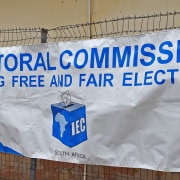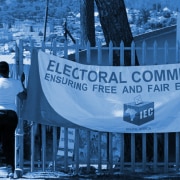|
Getting your Trinity Audio player ready...
|
Our heroes for the week are all those who contributed to the smooth running of the 2016 local government elections. An election doesn’t only happen on the voting day, but takes many months of preparation and work behind the scenes. A typical election cycle includes steps such as the confirmation of procedures and municipal boundaries, voter and party registration, media relations, financial matters, voting, counting, and the announcement of results.
Electoral authorities and government work hand-in-hand during the period before the election to ensure readiness, while political parties do their campaigning, civil society organisations raise awareness of related issues and carry out voter education, and the media keeps citizens informed of the latest developments.
On the day, election officials are on hand at voting stations, working long hours to assist voters and sometimes having to deal with circumstances that are not their fault, such as malfunctioning equipment. Police and security officials are out in force to keep the peace, and afterwards, hundreds of officials in the counting centre work around the clock to get the results out speedily and accurately.
But before that there are the special voting days which accommodate thousands of people who would otherwise be unable to vote, such as the elderly or sick and homebound individuals.
The electoral court also stands in readiness to swiftly pronounce on disputes and other matters escalated to it.
Observers are present at all stages and at all times to ensure that elections are free and fair.
Social media commentators offer minute-by-minute opinions, sometimes serious but often in a quirky way that pokes fun at politicians, officials and voters alike. South Africans have always been able to laugh at themselves and election time is no exception.
We salute all these players in the 2016 local government elections, who helped to ensure that democracy is alive and well in South Africa.







